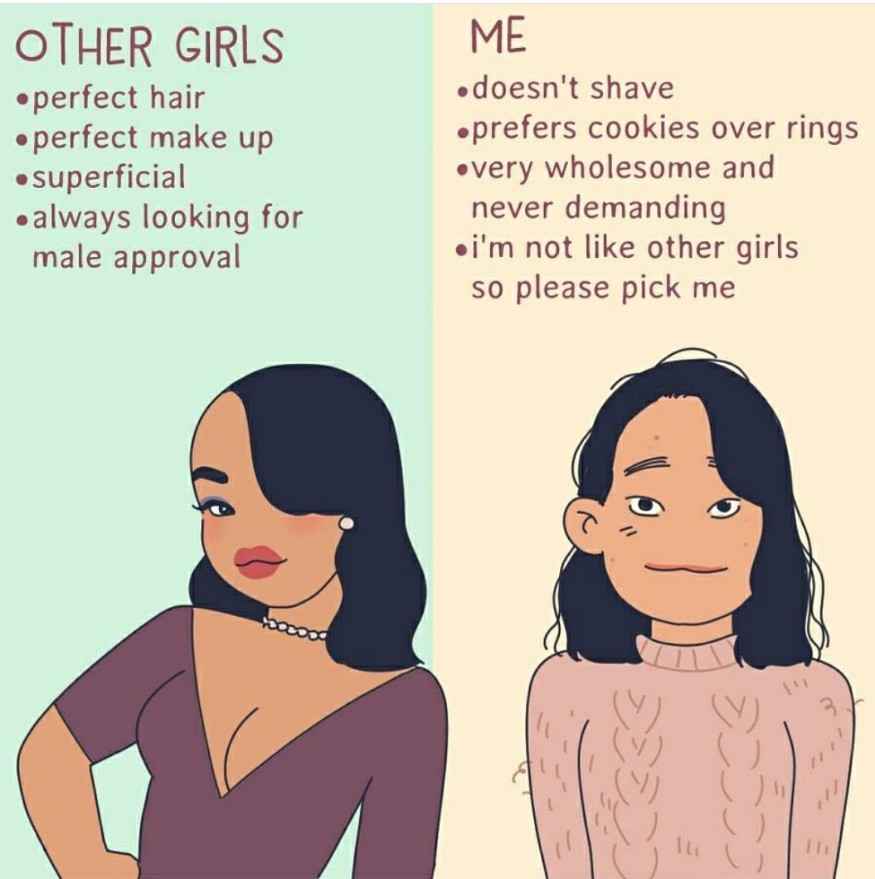“Not Like Other Girls”
March 29, 2021
In an effort to keep female main characters interesting, the media gives women unique traits that set them apart from the supporting characters. However, often these traits that give women the title of ‘unique’ are exactly the same across media platforms. They typically include enjoying reading, hating makeup and clothes, being sporty but only the ‘real’ sports, and never actively looking for a significant other but ending up with one regardless. This devotion to the same “unique” personality has contributed greatly to the formation of a distinct name for these characters coining the phrase “not like other girls.” While nothing is inherently wrong with being “like other girls,” the true issue stands in the fact that the majority of the traits that define female main characters who “aren’t like other girls” are anti-feminine. For example, in “Another Cinderella Story” with Hillary Duff, the female protagonist plays softball, wears jeans, frowns upon excessive makeup, and enjoys reading. The female antagonist wears skirts and makeup, is a cheerleader, and is extremely popular. As a stand alone movie this poses no issue, but this general dynamic of the main girl disliking “girly” things and the antagonist female being all those “girly” things our main character hates is used far too often to be seen as an anomaly. Particularly in Young Adult (YA) novels, this dynamic remains persistent, and any interest in feminine things is reserved for “evil” or side characters; the main female simply can’t be bothered by makeup or clothes. Even in the music industry, storytelling in songs overuse this trope. In Taylor Swift’s song “You Belong with Me”, Taylor writes ‘But she wears short skirts / I wear T-shirts / She’s Cheer Captain, and I’m on the bleachers’. Short skirts and cheering are both considered feminine things and are both perceived as negative in this song. (Taylor Swift is definitely a feminist advocate, but some of her earlier songs do make good examples for an “I’m not like other girls mentality”) The ties between femininity and negativity are peppered throughout movies, books, shows, and music far too often.
Most good protagonists are written to be relatable, so writing a reader into a book is understandable seeing as girls reading the book will relate with a main character who enjoys reading. Plenty of girls are not very feminine or girly and deserve relatable main characters. But assuming that because a girl reads she won’t be interested in anything feminine is problematic.The inequitable nature of feminine protagonists and nonfeminine protagonists creates the issue. Girls can be “girly” and still save the world or get the guy or become the princess. Authors, songwriters, and producers need to add diversity in their female characters personalities instead of adhering to the same female who is considered better than the other girls because she doesn’t partake in girly activities.
So how does this media actually affect women and specifically young girls? It teaches girls that femininity and being a strong protagonist cannot go hand in hand. It frowns upon feminine traits and drags down the entire feminist movement. It encourages hate between girls who are interested in different things and discourages girls supporting each other. Looking at an outlier to this dynamic, Elle Woods from Legally Blonde presents the perfect example of a female protagonist who retained her love for clothes and makeup and all things girly while still achieving her goals. If you’re not familiar with the movie (which you should totally go watch cause it’s amazing), Elle Woods, president of her sorority, blonde, extremely girly girl from Malibu, attempts to get into Harvard Law to chase after a boy. She succeeds, realizes the boy was a terrible guy, and falls in love with law. The important part for feminist purposes is that she never loses her sorority girl personality, and always shows up to court in a cute, often pink, outfit. If the distribution of female characters was more even, it would contribute to the feminist movement instead of dragging it down. Equally important, it would teach young girls that you can love whatever you want, girly or not, and still chase after and achieve your goals.



